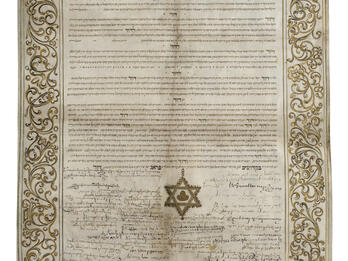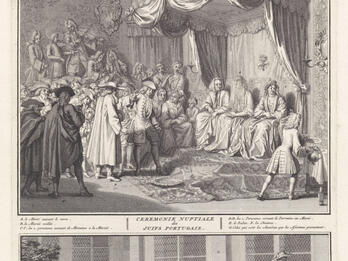Safed Exorcism
I was in the midst of a large group of people who were there, close to a hundred people, among them scholars and heads of communities. And two men, who knew adjurations and many things, approached the woman to make the spirit which was in the woman speak to them, by means of the smoke of fire and sulfur which they made enter her nostrils. [ . . . ]
And the woman was as lifeless, in that she did not pull herself away, nor moved her head away, neither from the side of the fire nor from the side of the smoke. And as a result of the adjurations a voice began to be heard, a thick and sustained voice, like the roaring of a lion and the voice of a young lion, without any movement of the tongue or opening of the lips. And when this voice began to be heard, the two aforementioned men exerted themselves and warmed themselves up quickly and diligently to do what they did rapidly, and they argued and spoke against him [that is, the spirit] with a loud voice and said to him: “You evil one, speak and tell us who you are in a clear language.” And then the voice revealed itself and appeared to all as the voice of a human. And they repeated and spoke to him in a loud voice and in the manner mentioned: “What is your name, you evil one?” And he answered: “So-and-so, and my last name is So-and-so.” And they asked him: “How can we know that you are So-and-so?” And he replied that he had died in Tripoli, and that he had left behind a son whose name was So-and-so, and that he had had three wives, and the name of the first was So-and-so, and the name of the second was So-and-so, and the name of the third was So-and-so, and that he had died while he was married to the third, and that she was now married to So-and-so. And as to all the signs he gave he spoke the truth. And then all of us who were there recognized that it was the spirit who spoke. And they asked him: “For what sin do you have to wander about in the world in these transmigrations?” He answered: “For the many sins I committed in my life.” And they again asked him: “Enumerate them.” But he said that he did not want to, for what use would there be in it. And then they pressed him very much that he should mention at least the greatest sin he committed, and he answered that he had been a heretic and had spoken against the Tora of our Master Moses, peace be upon him.
And many people testified that he actually had spoken such things while he was alive. And they asked him: “And now, are you still of that opinion?” And he replied with a groan in a bitter voice, shouting and storming, and he said: “I recognize that I sinned, transgressed and did evil.” And he asked forgiveness from the Holy One, blessed be He, and from His Perfect Tora for his many sins. And then the two men began to press him and to force him that he should go out from her and should go to a desolate desert place, and [did this] through all the [means] mentioned above, and [told him] that they would ask mercy for him and would blow the shofar so that he should not have to continue in this transmigration. And they said to him: “Do you want us to ask mercy and pray for you, and blow the shofar?” And he answered: “I do wish so.” They asked him who should blow the shofar. He said: “The sage, his honor R. Sh’lomo Alqabetz.” But that sage replied that he could not. They again said to him: “Ask for somebody else.” He said: “Let it be the sage, his honor R. Abraham Lahmi.” And they asked him: “Who should pray for you?” And he answered: “Let it be the rabbi Elijah Falqen.” And then we recited three times El melekh [that is, the Shema‘ prayer] and Waya‘avor [that is Ex. 34:6] with the blowing of the shofar, and everything was done as he wanted.
Then we said to him once more that he should depart since we fulfilled his wishes. He answered: “Let some time pass and then I shall depart.” And they asked him: “Do you wish that we recite a tikkun for your soul [a prayer for the repair or healing of your soul]?” He answered that no tikkun will help. They said to him: “Do you want your son to say Kaddish [the prayer for the dead] or to study Tora [for the peace of your soul]?” He answered that nothing will help him, and that his son is unfit to study Tora. And I asked him about the beating [of the dead] in the grave. And one of those who sat there answered: “This one certainly never entered his grave.” Then the spirit contradicted his words and said: “I did enter my grave on the day of my burial, and during the night they took me out of it and I never again entered it. And since that time, which was thirty-three years ago, I have been going from mountain to mountain and from hill to hill, and nowhere could I find rest, except that during that time I found myself in Shekhem [Nablus], and there I entered into a woman, and she came here, and they exorcised me according to all that is stated above. But they immediately placed amulets upon her so that I could not reenter her again.” And all this was true, for we knew from the mouths of others that this is what happened.
Notes
Words in brackets appear in the original translation.
Credits
Published in: The Posen Library of Jewish Culture and Civilization, vol. 5.




